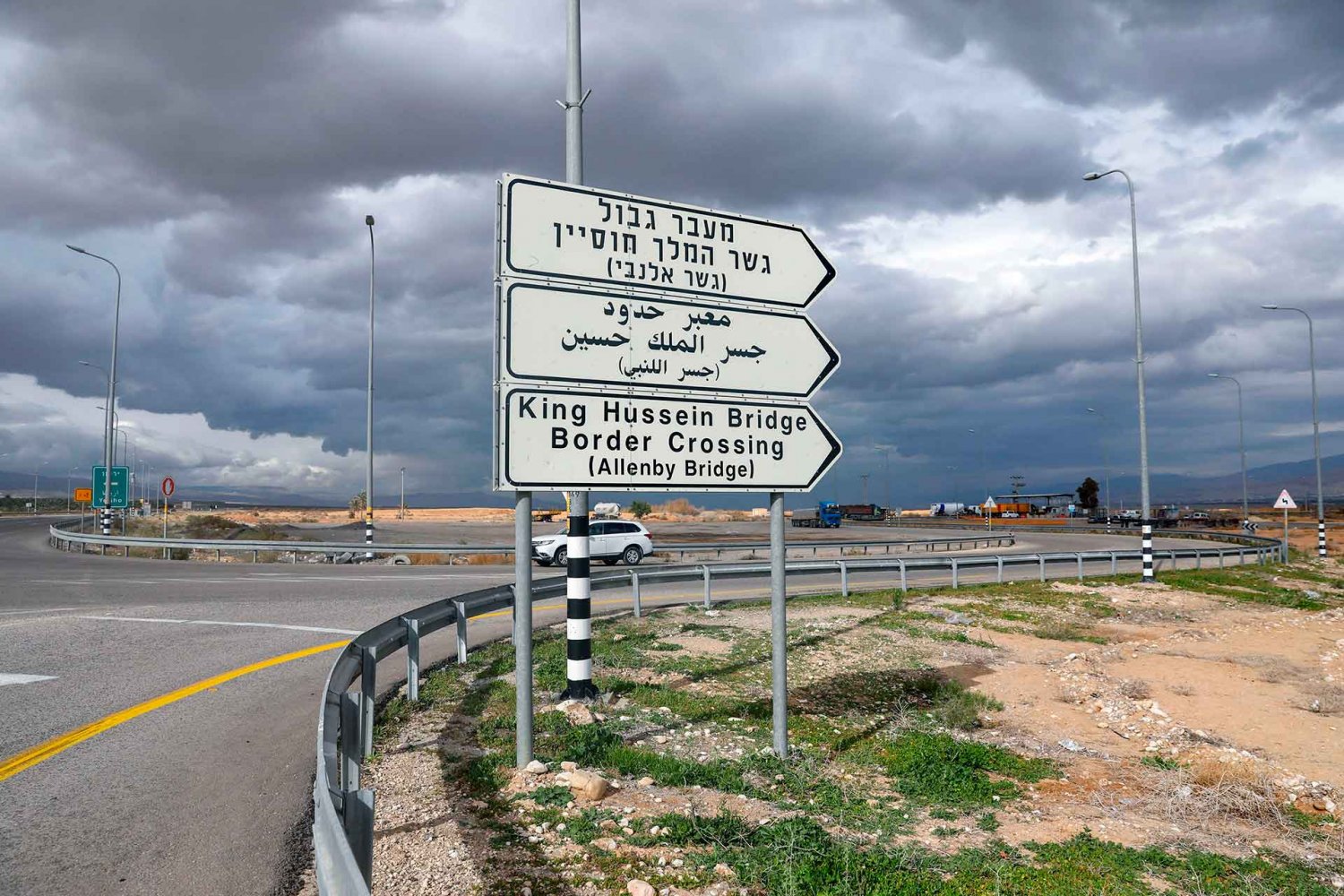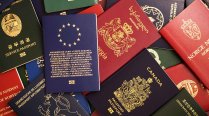Background

Credit:
Ahmad Gharabli, Getty Images
Visiting Palestinians in the West Bank? The Rules Remain Unclear, and You Could Be Denied Entry
Snapshot
A conversation with Israeli attorney Yotam Ben-Hillel, who is working with the Israeli human rights organization HaMoked to challenge new Israeli visa procedures that seek to isolate Palestinians in the West Bank from international visitors.
On October 20, 2022, Israel activated new procedures for foreign passport holders seeking to visit Palestinian areas of the occupied West Bank.
The procedures—detailed in a 90-page document issued by the Ministry of Defense—are confusing and created a situation of uncertainty for travelers.
Jerusalem Story interviewed Israeli lawyer Yotam Ben-Hillel, whose law firm has worked with HaMoked—Center for the Defence of the Individual, an Israeli human rights organization, to challenge the new rules in Israeli court. We spoke about the procedures’ implementation, what has changed—and what remains unknown.
Jerusalem Story: Can you update us on the status of the Israeli visa procedures that went into effect on October 20, 2022?
Yotam Ben-Hillel: The procedures entered into force only a month and a half ago, so it is really hard to tell how they are implementing them. There are a few issues where we know that there are problems already, such as people who have citizenship of the countries that are mentioned in the annex to the procedures: Jordanians, Egyptians, people from Morocco, South Sudan, and Bahrain. But the biggest group is the Jordanians—obviously there are a lot of Palestinians in Jordan. They have ties to the West Bank, and they are married to West Bank [Palestinian Authority (PA)] ID holders. Their entry to the West Bank is barred, and they can only enter with a separate procedure, which is a maximum three-month visa issued only under rare circumstances. It is very hard to extend this visa that they get, and it does not allow them to do anything—not to work, or volunteer, or study—just to visit your spouse in the West Bank.
Because of that, many people are actually stuck in the West Bank, [and have been] for many years. They couldn’t go back to Jordan, because their visa has expired, and if they leave, they will not be able to come back in. We know that this group is harmed by this new]procedure; their previous circumstances did not really change, but [the Israeli government] is now enforcing the rules more strictly.
And it is being enforced also against people who hold dual citizenship—people who hold Jordanian citizenship and also Canadian or European citizenship, for example. In theory, they could enter on their second passport, but Israel has decided to relate to them as Jordanians only, even though some of them hardly have any connection to Jordan. They have lived in the US or Canada for many years; they come to the Allenby Bridge, and the Israelis realize that they have a Jordanian passport and tell them to leave. We don’t know how many people this affects, but it seems to be quite a lot from the number of calls that we get.
Another big problem is the case of people who are married to PA ID holders, some of whom have lived for a decade or two in the West Bank, renewing their visas. The next visa renewal will depend upon whether they have submitted an application for family unification [i.e. applied for a PA ID on the basis of marriage or birth] and—not only that—whether the PA has sent their application on to the Israelis. For many years, this procedure was very problematic. The Palestinians hardly transferred any applications, because the Israelis told them they were not going to review them. The Palestinians said, “OK, we are not participating in this circus where you are not even reviewing the applications.” But now, if foreign spouses would like to extend a visa, it all depends if the [PA ID] application was actually transferred to the Israelis. It’s complicated, but this is part of the bureaucracy of the occupation.
JS: Is there any evidence that the family unification application process has been institutionalized at all to facilitate this new rule?
YB: We have been applying now for years to the Israelis on behalf of individuals who applied [for family unification]. We check with the Israelis if they have received that application or not. Sometimes we get answers from the Israelis and they say, “Yes, we got it and are reviewing it,” and then when we ask again about the same person, they say, “No, we never got it.” On both sides, there is a lack of transparency, and it’s quite hard to check. Again, this is something that will probably be resolved somehow with a judicial decision because at the moment, the situation is not good. We don’t know if this procedure works or not, and otherwise, people won’t be able to extend their visas.
For the first time, the procedure says that Israel can deny applications for family unification based on political grounds. This is now another tool in Israel’s game versus the PA. If the Israelis want to punish the PA for some reason, then they say, “OK, we won’t approve a family unification application.” In Israel’s eyes, too, this is always an issue of demography and people coming to the West Bank—even though it’s not Israel in any way. Most of these people live in Ramallah and Hebron, but Israel also counts every Palestinian living between the sea and the Jordan River [in the quest to maintain a Jewish demographic majority].
YB: The other problem is that, based on the Oslo Accords, the review of applications for Palestinian [Authority] IDs should be done by the Palestinian side. Israel has the right to refuse in certain cases, like in the case of a real security threat to the occupied territories being posed by a spouse, but now [the new procedures] say that Israel reviews the whole process. It’s not by the PA anymore—they treat them as postmen. They deliver the application from the Palestinian side to the Israeli side, but the Israelis decide, for instance, if the two people are a couple. How will the Israelis check that? Will they enter their home in Ramallah and check that? Will they go into people’s bedrooms? It’s ridiculous. We have to see how it is being implemented, but the current wording of the procedure is quite awful.
JS: The procedures indicate that if a foreign visitor is coming to the West Bank and Israel, they may enter through Tel Aviv’s Ben Gurion Airport, but anyone visiting Palestinians in the West Bank must enter through the Jordan crossing. Have you seen any details on how this is being implemented?
YB: Part of the new procedure is that they are insisting that people come through the Allenby Bridge and not Ben Gurion. This is part of the separation that is being done to Palestinians and their spouses: you should be in “your place” and others should be in the “good place” (although Ben Gurion wasn’t so good for Palestinians). At least theoretically, people who are coming to both the West Bank and within the 1948 borders should be allowed entry at Ben Gurion. But if they [the Israeli authorities] make it really hard on them there, and they see that these people are actually coming to the West Bank, the interrogation can get really nasty. They might tell them to leave and that they have to enter from Jordan. Sometimes it can make people’s situations really complicated, because then there is a bar against their entry in the [computer] system, and then when they try to enter at Allenby [from Jordan], they will have a problem and probably be denied and have to apply in advance to enter. And then they need to pay a bond and, according to the procedures, the bond can be really high.
JS: What is the latest on the legal challenges to the procedures?
YB: There was a first version of this procedure published in February 202]. We challenged this, first submitting a long letter to the office of Coordination of Government Activities in the Territories (COGAT), and we asked that this version be postponed until we got answers. Before [the procedures went into force], we went to court to ask them to amend the procedure. COGAT told the court that it wasn’t a final version (even though it turned out it was), and so the court was happy to dismiss the petition, because then they didn’t have to deal with it. Then COGAT published new procedures, and so we challenged them again. The challenges were dismissed and the procedures were implemented on October 20, 2022. We have to see how they will be implementing the procedures, but I’m guessing that there will be problems and we will have to go to court again.
They did make some changes, especially in regards to people coming to work in the West Bank. The scope of the people who can work in the West Bank is broader, and the quota of students, for instance, that are allowed to study at Palestinian universities was removed. Also they removed the [requirement] that every student coming to study would have to interview at an Israeli embassy in their homeland—which was ridiculous—although they left this as a possibility. They removed a few things, but the main problem is of the right to family life, and the many people who cannot enter the West Bank remain. It’s a long battle, and we will keep fighting.
JS: I understand that you are asking visitors or people affected by the procedures to submit their experiences to you. [The HaMoked survey can be accessed here.]
YB: We want to know how it is being implemented. There is nothing coming from the Israelis saying how many applications were submitted and how many people are entering from the borders. The whole thing is not transparent. Maybe the situation is great and nobody is being denied. If we know what the situation is, we can publish it and we can give people advice.
JS: In terms of taking the procedures to Israeli courts, how do you see yourselves being most successful?
YB: In general, I don’t expect much from the Israeli courts. It’s been proven that this is not a place for Palestinians to come and get justice. But at the moment, it is what we have, and we will try to do everything to minimize the hassle and the harm to human rights, especially the right to family life, but also the right to work, to study, and for Palestinians not to be isolated from the rest of the world—which is, I think, one of the purposes of this procedure. As an Israeli lawyer, this is what is open to me at the moment. Maybe if it doesn’t work, then Palestinians will have to look for justice elsewhere. They have started doing so in other cases.
I think that we also need to look at the overall picture and what [the Israeli government is] trying to achieve here. It is an issue of separating Palestinians from the rest of the world and not wanting people to come into the West Bank and get married and have family life with people here. All this bureaucracy—90 pages of procedure—it has a purpose, to make it difficult to understand and navigate within the system. They want to separate Palestinians and to make Palestinian society weak, and to keep it weak. When we challenge them [on the procedure’s details in court], we want to actually help people. But we have to zoom out for a moment and to see what the Israelis are trying to do here.
JS: Do you have any sense of how the new Israeli government might deal with this issue?
YB: At the moment, the government focuses on how to make Palestinian lives miserable, but in other areas: taking over their land, expanding the settlements, and so on. Once they [the new government and its extreme right members] start looking into this, it might be implemented in a very bad way.
Israeli control over the borders and the Palestinian population registry is part of the Israeli occupation that is hardly known to people. This kind of control of Palestinian lives and families and foreign spouses and people living in Gaza and the West Bank—people abroad hardly know. (In Israel no one cares.)
If the new government starts to make it hard for Palestinians on this issue also, it will be done in a way that not a lot of people will know about it.
We have to be there and witness what they are doing and not let them do it in the darkness.


